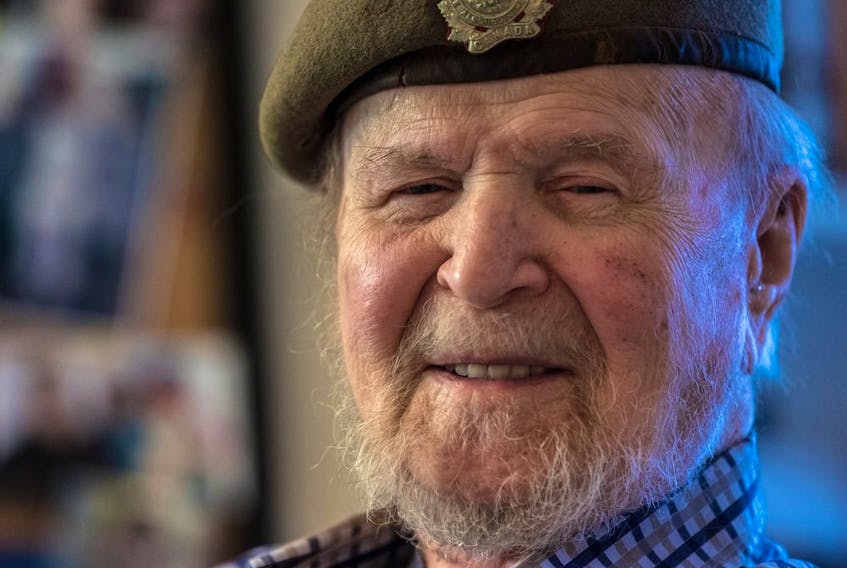Wolf Solkin has been a battler for most of his 97 years and his current crusade is to protect the lives of himself and his comrades.
Solkin is among the 120 veterans living at the Ste. Anne’s Hospital and he has been stressing the importance for hospital staff to follow strict protocols in the face of the coronavirus pandemic.
“We’re among the most vulnerable members of the population,” Solkin said in a telephone call from the hospital in Ste-Anne-de-Bellevue. “Most of us are in our 90s and we have some veterrans who are 100. Most of us are also vulnerable because we have what are considered underlying conditions.”
Solkin, a Second World War veteran, heads the veterans committee as well as the users committee, which advocates for both veterans and the civilian residents. In that role, he says he has butted heads with CIUSSS de l’Ouest-de-l’Île-de-Montréal, the regional board which oversees hospitals and CHSLDs in the West Island.
“It seems they’re always a day late and a dollar short when it comes to doing things,” Solkin said. “I called for the hospital to bar visitors well before it was mandated by the government. They were using this hospital as a dumping ground for patients from other hospitals and they weren’t testing people. There was a woman transferred here from another hospital which had problems and they didn’t test her. Later she was transferred again and she tested positive.
“We asked them to stop accepting transferred patients and they did but it’s a moot point because there are no empty beds here,” Solkin said.
Ste. Anne’s Hospital has reported only two confirmed cases of COVID-19 — one veteran and one civilian — but Solkin has seen how the virus can spread quickly and he pressed for changes in the way the hospital operated.
“There was no place to wash your hands before you came into the hospital,” Solkin noted. “There was a station inside the lobby and there was a suggestion that you wash your hands. Now, there’s station in the foyer and washing is mandatory. There were instances when nurses and orderlies were moving from room to room without masks.”
And then there was a problem with social distancing.
“The day shift ends here at 3:30 and I understand the staff was in a hurry to get home but there would 12 to 14 people on an elevator,” Solkin said. Now the policy mandates four passengers at a time with one person in each corner.
The West Island CIUSSS has been making headlines because of incidents at two of the facilities it oversees.
At least 33 residents died during the COVID-19 pandemic at the private CHSLD Résidence Herron in Dorval, and an orderly at the public CHSLD Grace Dart died after contracting the virus. Grace Dart has reported 62 confirmed cases of COVID-19.
Solkin has been a resident at Ste. Anne’s for eight years and said the level of care has gone down since control of the hospital was transferred from Veterans Affairs Canada to the Quebec government in 2016.
The hospital, which once housed nearly 800 veterans, has 445 beds and combines long-term care with a floor devoted to rehabilitation as well as short-term care for patients when there is a shortage of beds in other area hospitals.
“When the federal government ran the hospital, the care was excellent,” said Solkin, who has launched a class-action suit against the federal and provincial governments as well as the West Island CIUSSS. He claims they violated two parts of the 2016 transfer agreement.
“They promised the veterans they would receive the same level of care and they also promised that the care would be delivered in the language of their choice but there aren’t enough nurses who speak English,” Solkin said.
“If you go to a dentist you can point to the tooth that’s bothering you, but it’s more difficult when you’re talking about your spleen or your kidneys or your bladder.”
Related
Note to readers: We know the speed and volume of coronavirus-related news is overwhelming and a little frightening. To help with that, we will dedicate a Montreal Gazette reporter each day to devote their time to synthesizing the most important coronavirus-related news, especially as it relates to life in Montreal and Quebec. Follow the updates for April 20 here . All our coronavirus-related news can always be found here: montrealgazette.com/tag/coronavirus .
Sign up for our new email newsletter dedicated to local coronavirus coverage here: montrealgazette.com/coronavirusnews .
Copyright Postmedia Network Inc., 2020









